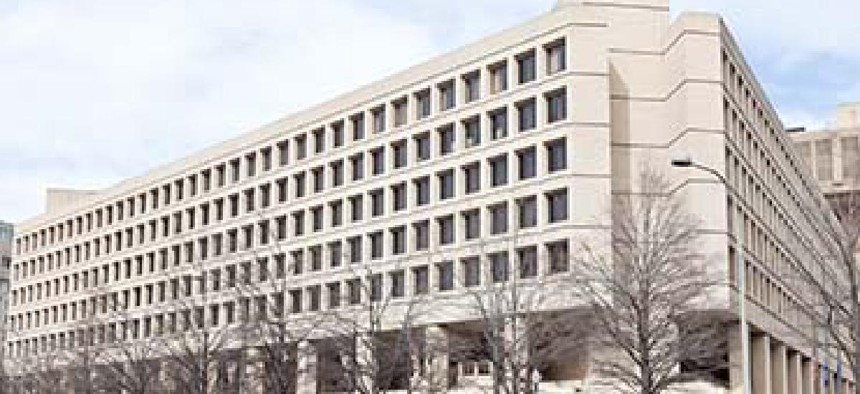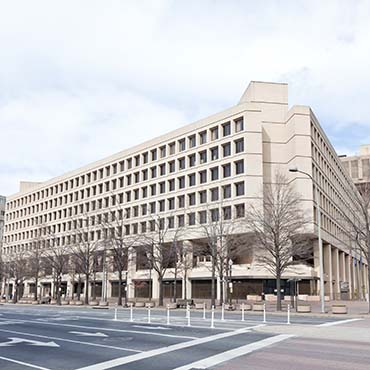Why the FBI relo went off the rails

The government burned tens of millions of dollars on a stalled effort to move the FBI out of its downtown D.C. headquarters.

The FBI's downtown D.C. headquarters.
The General Services Administration's failed attempt to broker a deal for a new FBI headquarters facility wasted millions of dollars and pushed progress almost back to square one -- a costly reminder of the risks that can come with creative procurement strategies.
The initial plan to relocate the FBI from its deteriorating headquarters from Washington, D.C., to one of three sites in either Virginia or Maryland entailed turning over the 43-year-old J. Edgar Hoover Building to a private developer, who would then build a new FBI campus. The cost difference would then be funded by the taxpayers.
However, the plan was called off by GSA leadership in July after funding requests for a new building came in way over what Congress allotted in its fiscal year 2017 omnibus bill. FBI and GSA requested $1.4 billion between them to cover the leftover costs; the spending bill allocated just over $500 million.
At an Aug. 2 hearing of the Senate Committee on Environment and Public Works, Michael Gelber, acting commissioner of GSA's Public Buildings Service, said that his agency, along with the FBI, "determined that moving forward without full funding would put the government at risk for project cost escalations."
"It is fair to say that the cancellation of the procurement was not the desired outcome," he said, adding that although GSA has the authority to select a site at any time, "without the full funding and the structure of procurement that we were operating under we had no assurance of being able to complete" the project.
The procurement process alone, by Gelber's estimate, burned about $20 million, as well as years of planning with little to show for it. Richard Haley, FBI assistant director and chief financial officer, testified that the FBI sunk "a significant investment" into the project but declined to comment on the exact cost.
Gelber and Haley testified that they would develop a plan for a new FBI campus within 120 days.
Committee Chairman Sen. John Barrasso (R-Wyo.) wondered if, regardless of funding, GSA's swap exchange procurement strategy was "doomed from the start."
Prior to commencing this project, GSA has never completed a swap exchange involving a building worth more than $11 million, according to GSA's inspector general.
David Wise, director of the Physical Infrastructure Team at the Government Accountability Office, described the swap exchange strategy as "a complicated mosaic of an effort."
Because of the project's lengthy timeline, "the developer has to have pretty deep pockets to be able to get engaged in a project like that," he added.
Sen. Ben Cardin (D-Md.) slammed both agencies for the waste of time and resources and pushed the agencies to pursue a different financing mechanism -- and to do so quickly.
He said that expecting Congress "to put $2 billion in one year's appropriation for one building's consolidation is not realistic," adding that this recent mishandling will make full funding "even more challenging."
For the hefty appropriations already doled out for the project, Gelber testified that "those funds are retained in the project budget," and can be reallocated to the new project with the permission of Congress. As for a timeframe, Gelber added that the construction of a new building "could take between five to seven years ... including the move."
As FBI and GSA restart the procurement process for a new headquarters, the current building is deteriorating, depreciating in value and will require significant maintenance costs to continue operations. Additionally, FBI relies on expensive short-term leases because the Hoover building cannot house all of the employees assigned there.
Wise testified that the "deteriorating" condition of the FBI's main campus, since at least 2011 "no longer fully supported the FBI's long-term security, space and agility required" to fulfill its mission.
Haley described to the committee the broken pipes, security concerns and capacity limitations posed by the current building.
An additional challenge is the lack of appointed leadership at each agency. The Senate confirmed Christopher Wray to take over as FBI director Aug. 1, but President Donald Trump has yet to nominate a GSA administrator.
NEXT STORY: Post-award, the real work starts on EIS


